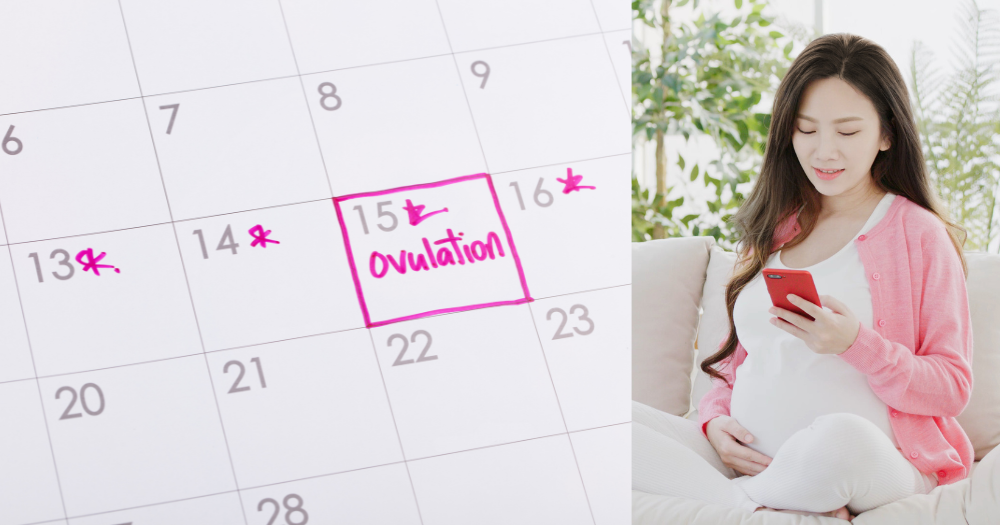Are you a couple who has been trying to conceive for quite some time to no results?
Or perhaps you are a couple who is thinking of having a baby, but is not sure of where to begin.
Regardless of the stage you are at where conceiving is concerned, there may be some burning questions you have regarding the topic.
We spoke to Dr Janice Tung, a Consultant O&G and IVF Specialist at Thomson Fertility Centre, about six factors that may affect a couple’s chances of natural conception.
Here’s what she shared.
1) Is timing important when trying to conceive?
To optimise chances of natural conception, the recommended frequency of lovemaking is about five to seven days before predicted ovulation, every other day, until your predicted ovulation window is over.
Many couples try testing for ovulation using ovulation kits and only have sex when they get a positive test.
This is unreliable and they often end up missing the boat.
This is because chances of conceiving are lower when you have sex after ovulation, as opposed to before ovulation.
Sperm takes time to get to the egg, and enough sperm concentration needs to build up around the egg.
Furthermore, the cervical mucus just before you ovulate is the most conducive, while changes occur to the mucus after ovulation that makes it less so.
2) Does the lady’s positioning after sex matter?
Many couples have heard about or tried this - where the lady lifts her legs up in the air after sex and maintains this position for any given period of time.
While this can be done and it is advisable that the lady does not get up immediately after sex (we recommend about half an hour), there is no scientific evidence for any advantage of maintaining this particular position for any extended period of time.
3) Does saliva affect the motility (function) of the sperm?
It has been shown in some studies that saliva does have a negative impact on sperm concentration and movement.
However, unless there is excessive saliva involved (such as where the vagina is the recipient of oral foreplay) or saliva is deliberately used as the main lubricating agent, it should not have a significant impact on the chances of conceiving where the male has a healthy normal sperm concentration.
4) Does lubricant affect the odds of getting pregnant?
The general answer to this question is no.
Such studies are difficult to conduct and are subject to a lot of recall bias and inconsistent results due to the many lubricants available, leading to the possibility of unreliable evidence.
Recently, larger population studies have shown that lubrication neither improves nor affects the odds of getting pregnant (i.e. people who do not use lubricants have the same rate of pregnancy as those who do).
Furthermore, there appears to be no significant differences in pregnancy rates with different types of lubricant (i.e. water-based, oil-based, or pH-balanced, etc).
Couples should decide whether or not to use lubricants depending on what they are comfortable with (for e.g., using lubricants that do not appear to cause sensitivity for them, etc).
5) Can you have regular periods but not ovulate?
Yes, but this is not very likely.
Most ladies who have regular cycles with approximately 26 to 36 day intervals are ovulating.
6) Can you be ovulating without having your period?
This is unlikely as ovulation should usually result in a period about two weeks later if you are not pregnant.
Some ladies may have very infrequent and unpredictable ovulation and hence, have long intervals without periods.
On the occasion they do ovulate, they can have a period.
However, they would only realise this in hindsight, which makes it difficult to try for a baby.
Visit a fertility doctor
As suggested by the Q&As above, there are several factors that may affect a couple’s chances of natural conception.
Another thing to note also is that being healthy is not necessarily a sign that you are fertile, with conception being affected by both male and female fertility.
If you and your partner have been trying to conceive for six to 12 months without success, consider visiting a fertility doctor.
Attend 'Know Your Fertility Wellness' Seminars
You can also attend the following fertility wellness seminars, where you can get your burning questions answered by doctors and experts.
Date: March 3 and 10, 2023
Time: 8pm to 9:30pm
Venue: SCAPE Gallery (Level 5), 2 Orchard Link, Singapore 237978
March 3
Invited doctors/ experts: KKH and SGH
Topics covered:
- Intimacy while trying to conceive
- All you need to know about sperm and male fertility
- All you need to know about cysts, fibroids, cycles & PCOS
- Fertility after pregnancy loss
March 10
Invited doctors/ experts: Thomson Fertility Centre & Thomson Chinese Medicine
Topics covered:
- What do you need to know about fertility treatments?
- What happens in an IVF Lab?
- How can TCM boost fertility?
In-person attendees pay S$8 per pax and will receive light refreshments and a gift pack from ClearBlue (worth S$107).
As seats are limited, pre-registration is required.
You can also join this seminar virtually for free if you can’t join in-person.
Click here to sign up and click here to learn more about fertility health.
For all the latest updates, follow I Love Children on Facebook, Instagram, and TikTok.
This sponsored article by I Love Children answered a few of this writer’s questions about fertility and conception.
Top images via Canva
If you like what you read, follow us on Facebook, Instagram, Twitter and Telegram to get the latest updates.
